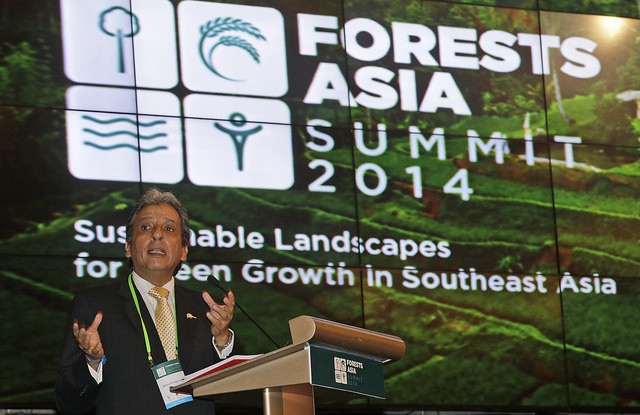
Editor’s Note: Check in at forestasia.org to see news updates from the Forests Asia Summit. Videos of all presentations and speeches at the Summit will be posted here.
JAKARTA, Indonesia — The world’s top climate scientist told an international conference today that tackling climate change is an opportunity, not a burden, and a leading financier said there is plenty of money to fund sustainable development.
“The path we need to follow is very clear if the world wants to limit the temperature increase to 2 degrees Celsius,” Dr. Rajendra Pachauri, chair of the Intergovernmental Panel on Climate Change (IPCC) told delegates on the final day of the Forests Asia Summit in Jakarta. “And that … should be seen as an opportunity, rather than something that will add a burden to different societies across the globe.”
“The cost of this pathway of mitigation is really very low,” said Pachauri, adding that the “loss in consumption per year globally would be no more than 0.06 percent of the global GDP.”
Peru’s Environment Minister, Manuel Pulgar-Vidal, who will preside over the UN climate change talks in Lima in December, said that forestry should be at the core of any future climate change agreement.
Southeast Asia is on the frontline of the fight to balance the needs of a growing population, a growing economy, and environmental protection. Ministers, civil society, academia, the private sector and youth took advantage of the two-day Summit to seek ways to better manage forests and landscapes in the shift toward a ‘green economy’.
Referring to the resources needed to finance this shift, Mark Burrows of Credit Suisse said, “this capital already exists at an enormous scale. An estimated US$225 trillion of private capital is currently allocated through the world’s financial markets.” The mood among the big investors is changing, he added. But “we need political investment to unlock financial investment.”
The next 18 months represents an unprecedented opportunity to address pressing climate and development issues, experts at the Summit said. In December 2015, countries will agree on an overarching climate agreement to replace the expiring Kyoto Protocol. The process of formulating the post-2015 development agenda and Sustainable Development Goals is taking place in parallel.
The commitments made at the Forests Asia Summit help put us on the path to a sustainable world
Forests play “an important role” in these frameworks, said Pulgar-Vidal, President of this year’s UNFCCC Conference of the Parties (COP) in Lima. Speaking at the Summit on Tuesday, he highlighted the complementary position of Latin American and Southeast Asian countries in the lead-up to the next climate agreement — and urged leaders in Southeast Asia to seize the moment.
“It should be clear that we are not going to repeat Kyoto … we are building momentum towards a new international climate agreement,” he said.
Unlike the Kyoto Protocol, he said, “this agreement will be reached from the bottom up” and be inclusive of indigenous people, the private sector, scientists and policymakers.
“And it will bring hope to millions because it will be a core component in the international development debate,” Pulgar-Vidal said.
Dozens of commitments were made at the Summit to increase green investment, expand research and foster dialogue among different stakeholders.
“The commitments made at the Forests Asia Summit help put us on the path to a sustainable world,” said Peter Holmgren, Director General of the Center for International Forestry Research (CIFOR), which hosted the Summit – attended by 2,300 people and watched by thousands more globally online.
Pehin Dato Yahya Bakar, Minister of Industry and Primary Resources of Brunei, committed to limit his country’s agricultural footprint to 1 percent of land area while working to improve yields to achieve greater food security — for the purposes of protecting Brunei’s tropical forests.
Demetrio Ignacio, Undersecretary of the Department of Environment and Natural Resources of the Philippines, shared his country’s experiences with an ambitious commitment to reverse decades of extensive deforestation by planting 1.5 billion trees throughout the country.
All Southeast Asian countries sent delegations to the Summit to share lessons and experiences on green growth and sustainable development. Ministerial-led delegations also came from Africa and Latin America.
Speaking at the conference on Monday, Indonesian President Susilo Bambang Yudhoyono called upon governments in the region to commit to sustainable land-use and investment practices that do not come at the expense of Southeast Asia’s natural resources — chiefly its forests.
Pulgar-Vidal was unequivocal about the need to act now. “We are in a special time,” he said. “We are building momentum because we are short on time.
“We need to have an output from Lima.”
We want you to share Forests News content, which is licensed under Creative Commons Attribution-NonCommercial-ShareAlike 4.0 International (CC BY-NC-SA 4.0). This means you are free to redistribute our material for non-commercial purposes. All we ask is that you give Forests News appropriate credit and link to the original Forests News content, indicate if changes were made, and distribute your contributions under the same Creative Commons license. You must notify Forests News if you repost, reprint or reuse our materials by contacting forestsnews@cifor-icraf.org.
